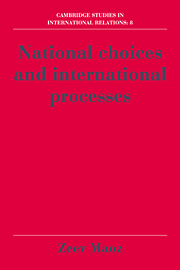Book contents
- Frontmatter
- Contents
- List of figures
- List of tables
- Preface
- 1 Toward a theory of international processes
- 2 Foreign policy decision making: assumptions and characterization of the approach
- 3 The inputs of decision making: identification and conceptualization
- 4 The essential mathematics of inputs
- 5 Models of the decision process
- 6 A formal characterization of decision processes
- 7 A theory of foreign policy decision making
- 8 The analysis of international outcomes
- 9 The evolution of international processes
- 10 Individual preferences, national choices, and international systems
- References
- Name Index
- Subject Index
8 - The analysis of international outcomes
Published online by Cambridge University Press: 05 February 2012
- Frontmatter
- Contents
- List of figures
- List of tables
- Preface
- 1 Toward a theory of international processes
- 2 Foreign policy decision making: assumptions and characterization of the approach
- 3 The inputs of decision making: identification and conceptualization
- 4 The essential mathematics of inputs
- 5 Models of the decision process
- 6 A formal characterization of decision processes
- 7 A theory of foreign policy decision making
- 8 The analysis of international outcomes
- 9 The evolution of international processes
- 10 Individual preferences, national choices, and international systems
- References
- Name Index
- Subject Index
Summary
INTRODUCTION
There is a fundamental difference between bargaining and negotiation. Bargaining denotes a process of interdependent decision making wherein each party acts to get the most for itself out of a situation in which the final outcome depends both on its choices and on the choices of other actors. Negotiation refers to a joint decision making process wherein the parties involved seek to coordinate their choices in order to assure a collectively desirable outcome (Zartman, 1977; Bartos, 1977). Negotiation, therefore, should be seen as a proper subset of bargaining processes: all negotiations entail bargaining, but not all bargaining processes entail negotiation. Another distinction between bargaining and negotiation is that the former process involves some degree of direct or indirect communication between the parties, while the latter process need not involve communication at all. In the first seven chapters, the analysis focused on independent decision making, in which nations try to resolve problems arising in their internal or external environment using their domestic resources. In the second part we analyze the relations between the ways nations go about solving these problems and what they actually get in an interdependent and interactive setting.
This chapter discusses how static theories of bargaining can aid our understanding of the emergence of international outcomes, how such outcomes are affected by intranational choice processes, and how they are affected by the interdependent structure of the environment.
- Type
- Chapter
- Information
- National Choices and International Processes , pp. 378 - 462Publisher: Cambridge University PressPrint publication year: 1990



